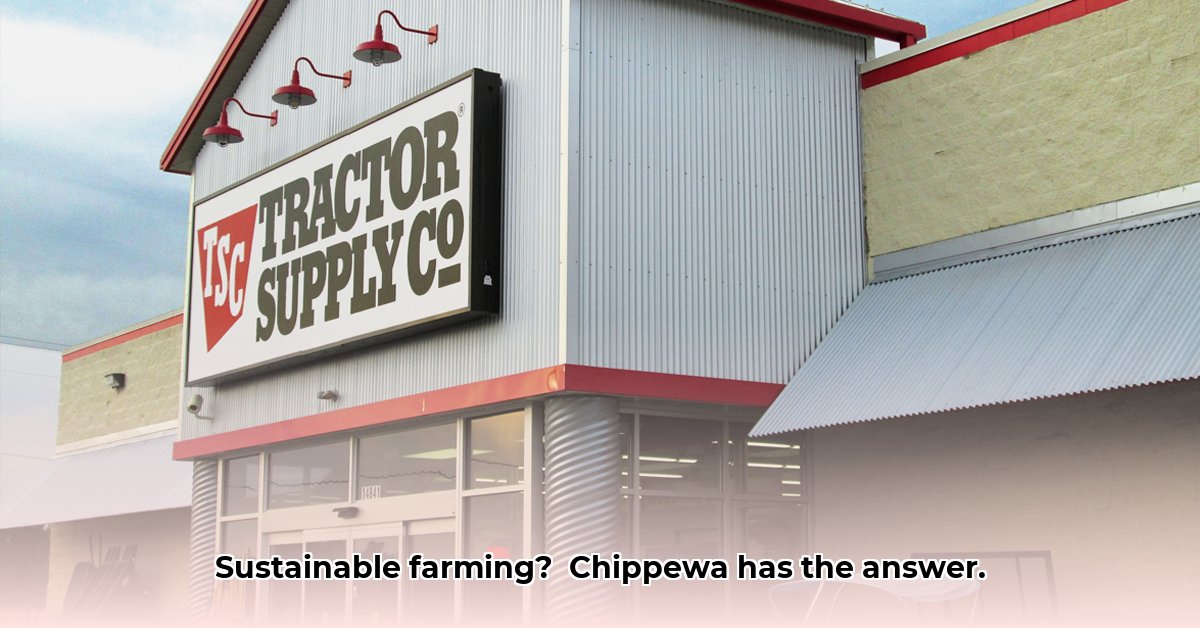
Finding the right supplies for your farm or garden in Chippewa, Pennsylvania can be challenging. Tractor Supply offers a convenient one-stop shop, but how does it stack up against sustainability goals? This article examines Tractor Supply's role in supporting sustainable agriculture, highlighting both its strengths and areas for improvement, and offering actionable steps for consumers and the business itself. For larger farming operations, consider the cost of equipment like a tractor.
Accessing Essential Farming Supplies: Convenience and Concerns
Tractor Supply provides easy access to seeds, fertilizers, animal feed, and tools—invaluable for small farms and home gardeners. This convenience is a significant benefit, eliminating the need for extensive travel. However, the sustainability of their operations requires closer scrutiny. How environmentally responsible are their supply chains? Are their products ethically sourced? This lack of readily available information poses a challenge.
Navigating the Sustainability Landscape: Transparency Gaps
While Tractor Supply offers products relevant to sustainable farming (e.g., organic seeds, water-saving tools), detailed information about their broader sustainability efforts remains scarce. This lack of transparency prevents consumers from making fully informed choices. Do they prioritize organic and ethically sourced goods? What steps are they taking to minimize their environmental footprint? These crucial questions currently lack clear answers.
Understanding the Current Situation: A Mixed Bag
Tractor Supply's convenience undeniably benefits local farmers and gardeners. However, the absence of readily available data on their sustainability initiatives hinders a complete assessment of their contribution to environmentally responsible practices. This lack of transparency represents a missed opportunity to connect with environmentally conscious consumers.
Actionable Steps for Tractor Supply: Toward a Greener Future
To enhance their sustainability profile, Tractor Supply should:
Enhance Supply Chain Transparency: Conduct a thorough review of their supply chain, focusing on suppliers' environmental and social practices. Publicly share this information to increase transparency and accountability.
Establish Measurable Sustainability Goals: Set specific, measurable, achievable, relevant, and time-bound (SMART) goals for reducing their environmental impact (e.g., carbon emission reduction, waste minimization, renewable energy usage). Regular progress reports would build trust.
Prioritize Sustainable Suppliers: Actively seek and partner with suppliers committed to sustainability, including local producers and certified organic farms. This would directly support eco-friendly production methods.
Promote Sustainable Products: Increase the visibility and availability of certified organic, fair-trade, and locally sourced items. Clear labeling would assist environmentally conscious consumers in making informed decisions.
Actionable Steps for Local Farmers and Consumers: Making a Difference
Consumers can contribute to a more sustainable agricultural system by:
Informed Consumption: Prioritize sustainably produced items, looking for certifications like USDA Organic or Fair Trade when shopping at Tractor Supply or other retailers.
Waste Reduction: Implement environmentally conscious practices on your farm or garden, including responsible fertilizer and pesticide use, waste management, and water conservation.
Supporting Local Businesses: Support local businesses committed to environmental responsibility. This provides direct economic incentives for sustainable practices.
Fostering Community Engagement: A Collaborative Approach
Tractor Supply could enhance its sustainability efforts by partnering with local organizations to host workshops and educational events on sustainable farming practices. This fosters community engagement and education, benefiting both the business and the environment.
How to Choose Sustainable Gardening Supplies at Tractor Supply
Choosing sustainable gardening supplies requires mindful selection. Look for:
- Certifications: Organic labels indicate products grown without harmful chemicals.
- Sustainable Materials: Choose tools and packaging from recycled or eco-friendly materials.
- Soil Health: Invest in natural soil amendments like compost or peat-free alternatives.
Beyond individual product choices, consider:
- Heirloom Seeds: More resilient and better adapted to local climates.
- Companion Planting: Improves growth and pest resistance.
- Water Conservation: Use efficient watering techniques (drip irrigation).
- Composting: Reduces the need for synthetic fertilizers.
Moving Forward: A Call for Action
Tractor Supply's contribution to sustainable agriculture relies on increased transparency and proactive environmental stewardship. While the store offers essential supplies, a lack of detailed information on its sustainability efforts prevents a complete assessment. Increased transparency, community engagement, and conscious consumer choices are crucial for building a more sustainable future in Chippewa and beyond. Further research into the environmental impact of Tractor Supply's operations is required for a comprehensive understanding of its role.